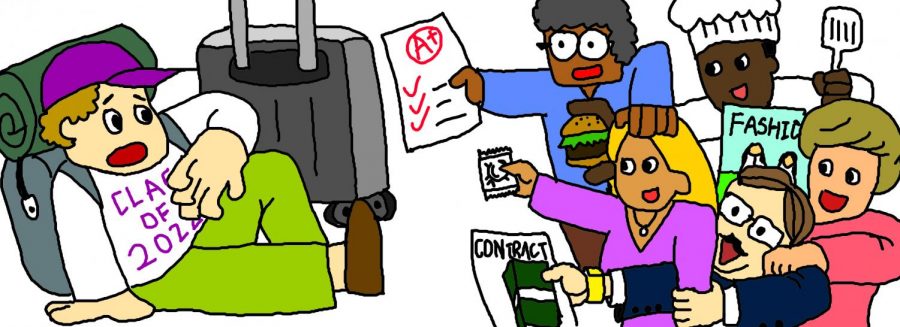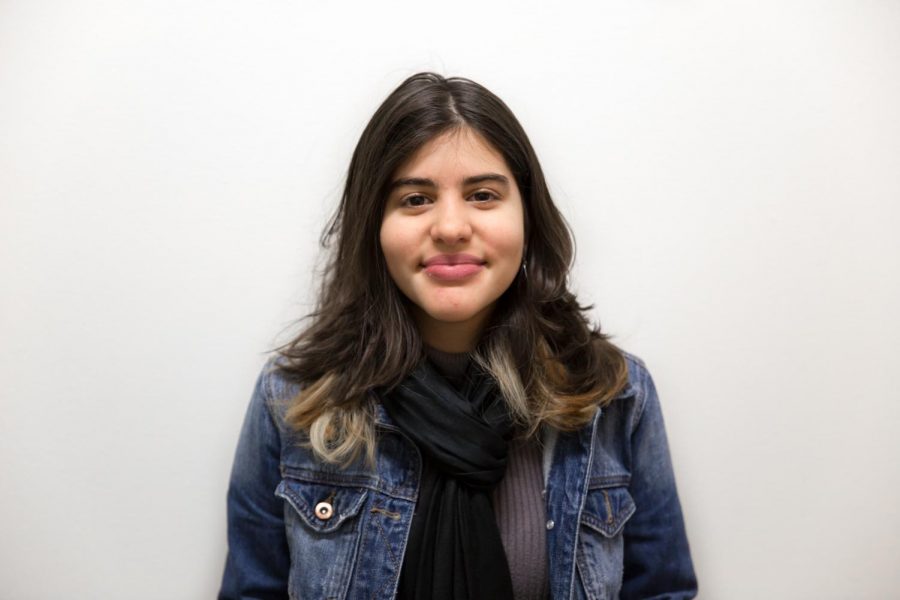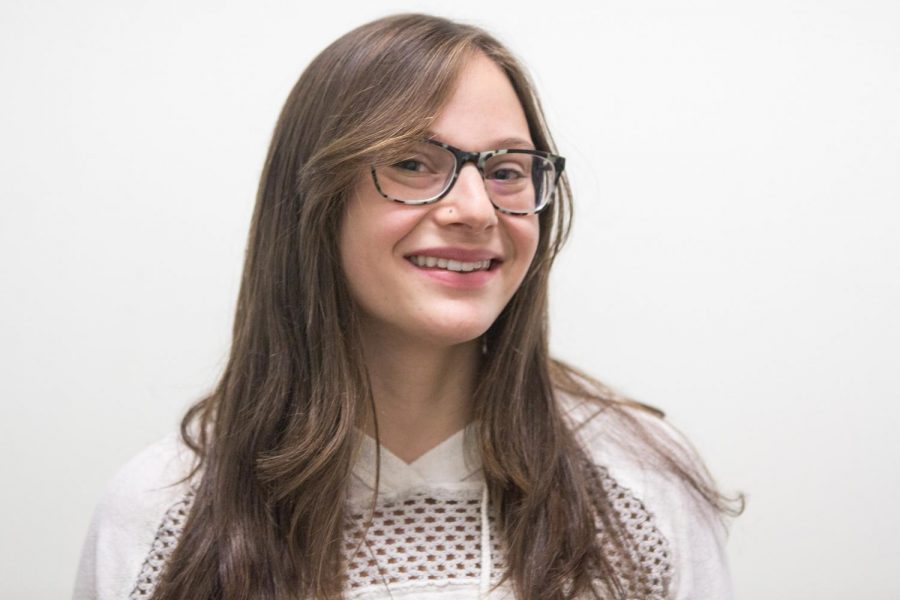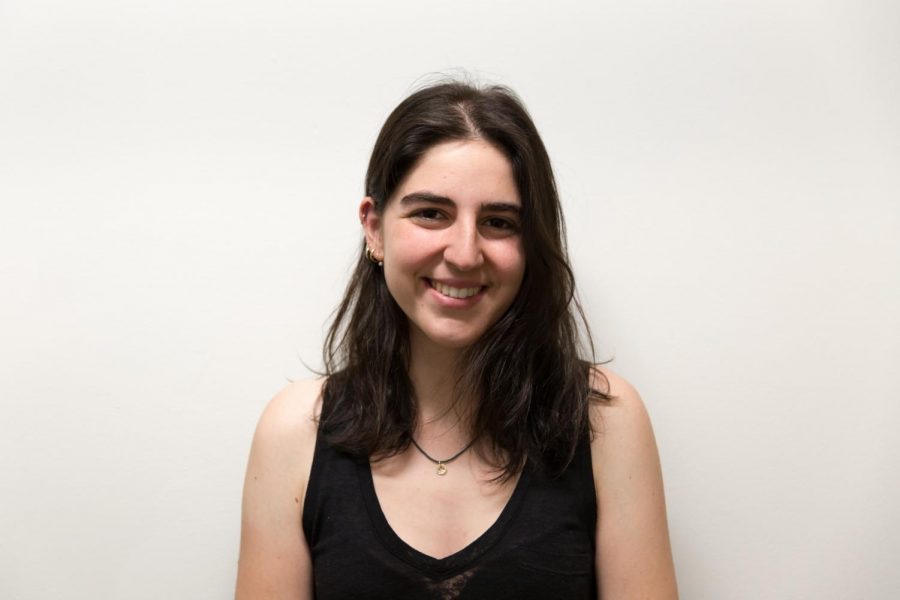On Adjusting to NYU Life
When I received the acceptance email into the Hurricane Maria Assistance Program, I promised myself that I would make the most out of the opportunity, but I never imagined it would take a toll on me. Students who are considering NYU should know that the city and university can be vibrant places, but that they can also feel as far away as skyscrapers.
I remember sitting down on my first day of class and enthusiastically talking to the stranger on my left, who skeptically followed my conversation. As we walked to the park after class, he smiled and jokingly said that he felt social anxiety at the beginning of our talk — that speaking to random classmates at NYU was uncommon. When I got to my apartment that night, after telling my roommate that story, she kindly responded that she felt NYU had no sense of community. While some would have thought these were omens, I shrugged them off.
However, I soon learned that they weren’t completely wrong. Adjusting to the city, making friends and getting involved didn’t prove to be impossible, but it was harder than I thought. In the first weeks, I joined four organizations, I completed all my readings, I emailed activist groups in the city and I tried to master small talk. But as I felt overworked by activities, isolated in student organizations, as I received very late responses to my emails and realized that small talk wasn’t leading to more profound conversations, I quickly grew tired. Mid-semester, I realized I needed room to breathe. I dropped some organizations, acknowledged that I needed to sleep in the city that never did and decided to be grateful for the friends I did have in whatever shape they took.
The city is full of lights, but it can suck the light out of you, especially in seemingly eternal winter. In no way do I regret my experience, and I will always be aware of my privilege, but I lacked focus and preparation in a very fast-moving atmosphere. Students should be aware of the benefits and hardships of the city so that they can be prepared when they step foot in it.
Opinions expressed on the editorial pages are not necessarily those of WSN, and our publication of opinions is not an endorsement of them.
Email Ignangeli Salinas-Muñiz at [email protected].
On Figuring Out Fashion at NYU
Fashion and I have a complicated and mostly contentious past, but before coming to NYU, I thought I had finally figured out to how dress myself somewhat well. However, it became very clear to me on my first day here that I’m still a lost cause in a cold and confusing world of designer brands, makeup fads and the long list of fashion do’s and don’ts (I’ve spent a lot more time in the don’t category than I would like to admit).
I didn’t know Gucci even made sneakers until I noticed that half of my Cultural Foundations class was wearing them on the first day of class. I thought Louis Vuitton and Louboutin were the same thing until I was laughed at and corrected by my new, fashion literate friends. I was told by the same friends that my Fjallraven backpack went out of style in 2016. I had never seen so many men wearing jewelry and chelsea boots. Of course, I had no idea what Glossier was.
One of my good friends, a tell-it-like-it-is type who happens to be particularly style savvy has not minced words in giving me fashion feedback. She once told me I looked like a Peanuts gang character when I wore a particularly boxy Brandy Melville T-shirt my mom had given me as a Hanukkah present. Another time she called me a “frat-boy” because of a certain sweatshirt and flannel combination.
The year is almost over, and with the help of some properly fitting jeans, a real winter coat and some creativity I can say my fashion sense has slightly improved. But as I find myself caught in the trend and gravitating closer to the fashion orbit, I can’t help but ask myself, is NYU’s fashion culture extra or awesome?
While there are certainly some examples of true superfluousness (a certain, particularly expensive looking boy in my Social Foundations class comes to mind), I think NYU’s fashion forwardness speaks to the drive and creativity of the students. The friends I have made and people I have met here —
particularly those with good style— are some of the most ambitious, interesting and just plain cool people I know. Sure, up-to-date style is a luxury — NYU students are, on average, richer than most — but style can also be a way to show personality and maturity. People who dress well seem to really have their sh-t together.
As for me, I’ll probably never own anything by Balenciaga, but my NYU peers have inspired me to want to up the ante on the wardrobe front. This summer, maybe I’ll actually take the time to find some nice tank tops — or, dare I say, dresses — and give the Peppermint Patty getup a rest. And who knows, maybe next winter I won’t wear the same pair of Doc Martens every single day. Maybe just every other.
Opinions expressed on the editorial pages are not necessarily those of WSN, and our publication of opinions is not an endorsement of them.
A version of this appeared in the Monday, April 30 print edition. Email Alison Zimmerman at [email protected].
On Dating at NYU
Swipe left. Swipe right. Swipe left. Swipe left. Swipe left. The mind-numbing, nightly routine that consumes many of us, until the pictures blur together — until I swipe without looking, knowing full well that in the end it won’t matter. I’m never going to meet up with anyone from the app, yet I continue to swipe my nights away. Each time I match with a decent guy, our future is obliterated by their perverted opening line, or my mom’s voice in the back of my head, lecturing me on the perils of online dating. If the conversation manages to get far enough to reach the, “So, do you want to go out with me?” My responses vary — to be candid, sometimes I do say yes — however, the end result is the same: a lost connection, either because of my fear or Tinder’s magic escape button. Unmatch. Try as I might, I simply can’t buy into the dating app nor the hookup culture like so many others do at NYU.
In my first year at NYU, I feel like I have gotten a solid grasp on the dating options. You either stay in, swiping until you find yourself a match, get dolled up and go out, only to never see the same guys again, or cling onto the hope that you’ll meet someone the traditional way — perhaps in one of your classes or maybe in your favorite coffee shop. While the latter seems like the favorable option, the reality is, meeting your match organically is rare in the big city and especially at NYU. This university mirrors New York City’s culture of isolation, of finding pockets of people and sticking to them. As a result, I’ve found myself running into the same faces, all great friends, but nothing more.
At first, this dating culture put me off. I was used to high school relationships and knowing someone well far before your first date. I didn’t want to meet up with complete strangers nor go home with a guy who sidled up to me at the club. This is still my mindset. However, I have come to the realization I don’t have to buy into hookup culture, or even dating on its own. I love spending time with my friends, working at WSN and, yes, even the late night study sessions. I like not having to constantly text someone or worry over which boys liked my last Instagram post. Being single is exactly what I need at this time in my life; I am 18 years old and living in New York City — what better time to be single?
Opinions expressed on the editorial pages are not necessarily those of WSN, and our publication of opinions is not an endorsement of them.
A version of this appeared in the Monday, April 30 print edition. Email Tyler Crews at [email protected].
On Being a Student and Working
I was not allowed to work during high school. My mom discouraged it, urging me to instead focus on my studies. I’m grateful for her decision because I am now a student at NYU, my dream school, and I know my excellent academic record contributed to my acceptance. However, throughout my time at NYU thus far, I have not experienced what it is like to be just a student. On top of being a full-time student, I have worked part-time since my first year. If I’m not at class, I am most likely at one of my jobs. Even though working as a student entails sacrificing a significant amount of your free time and maybe having to say no to your friends every once in a while, it is worth it.
I have sustained myself since I started college, providing for myself: groceries, vacations, textbooks, transportation — you name it. Every time the direct deposit hits my bank account every two weeks, I get the satisfaction of knowing that I earned that money, and I don’t have to financially rely on anyone else. Don’t get me wrong, I still rely on my mom for some things, but I know that I don’t need her help because I can completely financially support myself if need be. The financial freedom is liberating.
While working during college is a clear resume booster, it also teaches you valuable skills such as prioritization, time management and commitment. I work between 20 and 25 hours a week, but I designed my class schedule so that on Mondays, Wednesdays and Fridays, I finish class and work by 2:30 p.m. That gives me three days where I have the entire afternoon and evening to do homework or something fun. Other weekdays, I am at class or work from 9 a.m. — sometimes earlier — until 6 p.m. or later, usually with a short 30-minute break during the day. Due to my strict schedule, I have to plan my weeks and prioritize assignments. My planner is my bible — I even plan when to meet with friends or go to the gym. While my time is usually accounted for on my planner, I always leave time to have fun. And more importantly, I have learned to accept when I have to deviate from my schedule.
Working as a student, even as a first-year, is a sacrifice, but it is also rewarding. NYU and New York City have so many opportunities to offer — don’t be afraid to take advantage of them. A busy schedule and the accompanying stress is part of the NYU lifestyle.
Opinions expressed on the editorial pages are not necessarily those of WSN, and our publication of opinions is not an endorsement of them.
A version of this appeared in the Monday, April 30 print edition. Email Paola Nagovitch at [email protected].
On Food Culture in Turkey and at NYU
Food is an important part of every culture: you don’t get to really absorb and comprehend it until all the different flavors are on your tastebuds. A lot can be understood about a country from what they eat and how they eat it.
As for me, I was lucky to grow up in Turkey, a country with a history that dates back to the 11th century with the Turkic people, who got their start as nomads that traveled from central Asia to the Middle east. As the 13th century came around, their nomadic nature shifted into beyliks. Many fights and sieges later, the Ottoman Empire reached the pinnacle of its might and glory culminated in Constantinople, now known as the beautiful city of Istanbul. This journey not only led to an extensive history but an amazing culinary cross-pollination. The journey cooked up a fusion of Asian, Middle Eastern and European cuisines.
Turkish people love food. They love eating it and sharing it. I can easily say that most of my memories in my life feature food in some way. When I came to NYU, I was worried that the on-the-go lifestyle would not be suitable for me. I knew that people in New York move non-stop and are constantly taking their food to go. It made me nervous to think about the different ways people consume food here and whether I would to be able to afford food in the same way I did in Istanbul. I knew I would miss the food culture I had back home since having dinner alone was not something my family did. You have to stay in Turkey for at least a month to get a sense of our food culture, so I did not think it was fair for me to expect from New York what I had in Istanbul.
Breakfast in Turkey can be a family gathering, adorning a table with different homemade jams, 10 types of cheese, bread, eggs, pastirma (turkish dried meat), sucuk (turkish chorizo), pastries, fresh tomatoes, and cucumbers with olive oil and olives, or can be as simple as sitting on a bench in front of the Bosphorus sipping tea from a special turkish tea cup and biting into simit — a type of round bread covered with sesame seeds — you buy from a street vendor.
Dinner is eaten as soon as all members of the household are seated at the table and not a second before. Food is what brings the family together, the dinner table is where you share how your day was. Love is better shared and so is food. Many of the dishes in Turkish cuisine are portioned to share, so you can taste as many as you can. You order to the middle of the table and create your own private buffet.
Making people eat food is almost a conversation that has to be had, especially if you are under your grandmother’s roof. Failing to finish the food on your plate results in your grandmother questioning her cooking skills and your health, and so you eat. Especially your rice, the number of rice grains that you leave on your plate indicates how many children you will have, so eat up.
My concerns were justified after my first semester at NYU. I found it surprising that people did not wait for eachother, but ate regardless if everyone was there. One of the first dinners I had in Palladium Dining Hall with a group of friends ended with me forcing everyone to wait until everyone was seated at the table, which took around 30 minutes considering the grill line in Palladium. It was surprising that people did not force others to taste whatever it is that they were eating, but rather expected them to ask.
However, slowly my friends and I met halfway, and culturally cross-pollinated in some sense. To supress my need for passionate conversations about food, I turned to writing about it for WSN. Although I miss everything about the food culture in Turkey, I was able to discover the delicious and diverse food culture of New York that has not only widened my understanding of how we consume food, but how there is always room for more.
Note: The author of “Talking with My Mouth Full” and co-founder of American Food Roots, an online food journalism site stated that the three greatest cuisines in the world are French, Chinese and yes, you guessed it, Turkish. Just saying.
Opinions expressed on the editorial pages are not necessarily those of WSN, and our publication of opinions is not an endorsement of them.
Email Yasmin Gulec at [email protected].
On Transferring to NYU
Losing my first semester has made me distinctly aware of its value. I am a first-year transfer student — yes, that is a thing. I spent my first semester at another university and came to NYU in January of this year. Although I am still on track to graduate and have not lost out on many opportunities, there are some not so obvious consequences to transferring.
The largest consequence, in my opinion, has been not being able to room in a first-year residence hall. When preparing to transfer, I looked up the different housing options at NYU and expected to be rooming in Rubin or Third North or Lipton — but upon applying for housing, none of these were an option for me. Instead, I could only choose from upperclassmen dorms, and ended up in Carlyle Court.
Rooming with all sophomores as a first-year means a few things. It means that everyone except me has known each other for at least a year. It means I am the most likely to be talked down to. It means that I no longer have the opportunity to make a life-long friend with my first-year roommate — something I was skeptical of prior to college but now see some merit in. Instead, despite the efforts of my roommates to be inclusive, I will always be somewhat of the odd-one-out.
At my prior institution, I had become good friends with my roommate. We had bonded for some time, learning each other’s quirks and making an effort to be friendly, as we were both going into a new environment without any prior friends. That mutual motivation to not only be friendly, but to become friends, is not there entering a school mid-year. It doesn’t help that the first-year friends I have made are generally not nearby, making it harder to reach out and go with the easy “want to get dinner at the dining hall” route to friendship.
I am not trying to feel sorry for myself — OK, maybe I am a little. I just learned, the hard way, the value of coming into a school with others, eager to make friendships, ready to conquer college together. For non-transfer students, appreciate that experience. For incoming first-years, take advantage of it.
Opinions expressed on the editorial pages are not necessarily those of WSN, and our publication of opinions is not an endorsement of them.
Email Victor Porcelli at [email protected].







